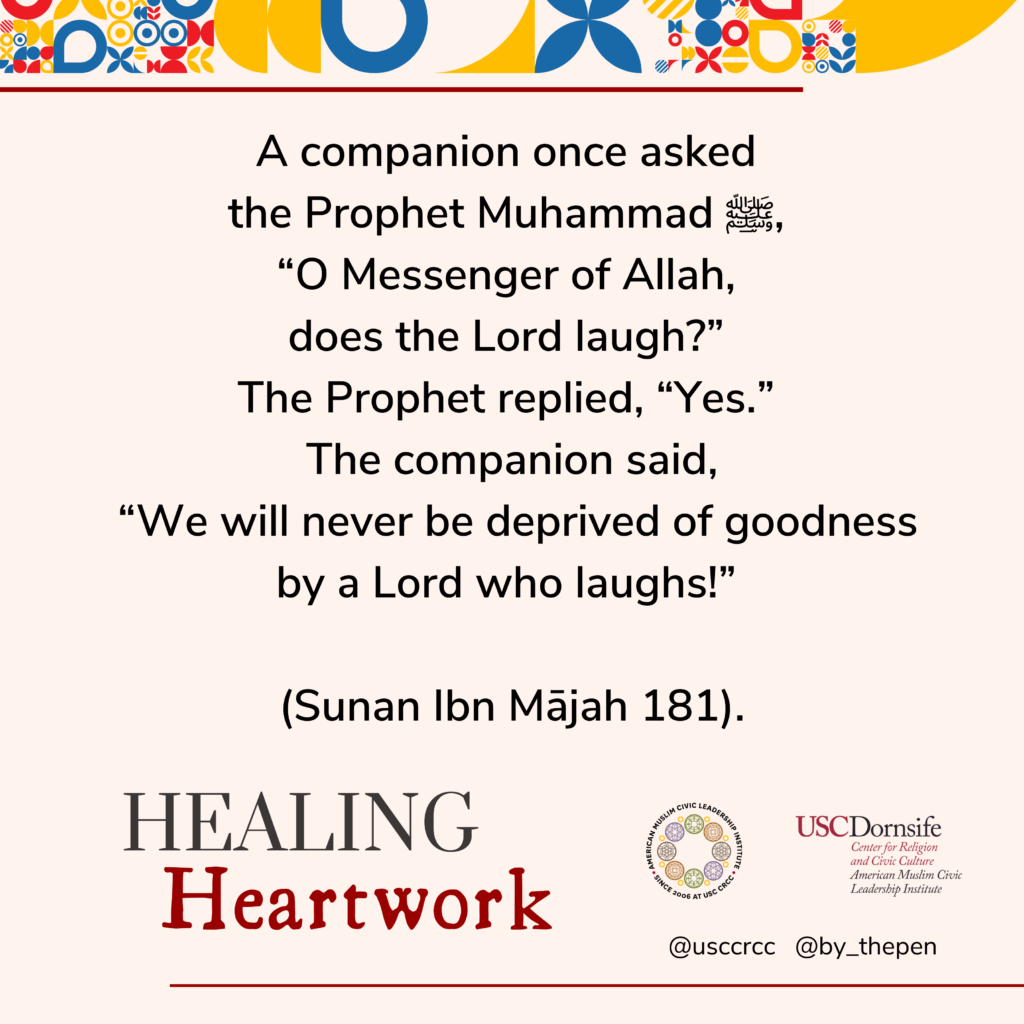A patient with a permanent visual impairment once asked me, “Why did God give eyes to blind people?” She wondered aloud why God did not, for instance, leave the sockets empty, and she questioned the presence of the eyeballs when they lacked the primary function of seeing. As the chaplain, I held space for her exploration and offered a thought or two, but she did not settle on a satisfactory answer in that conversation. The next day, she met me with excitement, concluding, “Chaplain, I know why God gave eyes to the blind – because God has a sense of humor!”
In the patient’s question, she attempted to reconcile why God gives all of creation eyes but only some with the function of vision, and in her answer, she approached the inconclusive nature of it all while honoring a positive opinion of God.
A companion once asked the Prophet Muhammad ﷺ, “O Messenger of Allah, does the Lord laugh?” The Prophet replied, “Yes.” The companion said, “We will never be deprived of goodness by a Lord who laughs!” (Sunan Ibn Mājah 181).
A “Lord who laughs,” or God having a sense of humor, reveals the quality of humor that enables us to approach a person or situation with mercy, as Muslims believe God does. Both this patient and the companions of the Prophet Muhammad ﷺ felt comforted by their relationship with a Merciful God.
Humor has the potential to relieve or reinforce pain. In Islam, humor serves the purpose of healing, not harming. We learn from the Qur’an and the example of the Prophet Muhammad ﷺ how to achieve the former and avoid the latter.
We can realize the potential of humor as a healing modality while also upholding mercy for self and others by remaining mindful of our words. The classic rhyme of “sticks and stones” declares that words contain little harmful power. Those on the receiving end of mocking or ridiculing language, however, may hold a different opinion. The Qur’an captures this sentiment powerfully, stating, “O you who believe! Let not some men among you laugh at others: It may be that the latter are better than the former. Nor let some women laugh at others: It may be that the latter are better than the former. Nor defame nor be sarcastic to each other, nor call each other by offensive nicknames. Ill-seeming is a name connoting wickedness…And those who do not desist are indeed doing wrong” (49:11).
The Qur’an offers clear etiquette around humor that does not transgress the dignity of God and creation. Muslim theologian Imam Al-Ghazali lists certain conditions for merciful humor, such as one may not lie or exaggerate to garner laughs. In a hadith narration, the companions of the Prophet Muhammad ﷺ commented on how he joked with them, to which the Prophet ﷺ replied, “Yes, I do. But I only tell the truth” (al-Tirmidhī, n.d. 357).
In one illustrative instance, the Prophet Muhammad ﷺ jokingly referred to his companion, Anas ibn Malik, as “O you with the two ears!” (al-Tirmidhī, n.d. 3828), which both states a fact and elicits amusement. Al-Ghazali lists several more tenets of merciful humor, such as avoiding jokes that center racy or suggestive elements, jokes that contain unkindness, and jokes that scare the listener. Finally, Al-Ghazali teaches that humor always requires wisdom – some situations call for gravitas rather than levity, and one must know when to use one and not the other.
This quality of wisdom in humor surfaces in other ways. From court jesters to wise fools, comedians hold a long-standing reputation of speaking truth to power from behind the facade of entertainment. In the Islamic tradition, humor is used as a subtle yet potent teaching tool. Much of Sufi literature, for instance, draws upon humor and jokes to convey important lessons about spiritual development, such as the story of the chickpea in Jalal-Din Rumi’s poem.
After being immersed in boiling water, the raw chickpea pleads with the woman cooking to remove it from the pain of the heat. The woman lovingly declines, informing the chickpea that the hot water serves to cook the chickpea so that it can reach its delicious potential. This amusing story teaches that we as humans dislike and avoid discomfort and pain without realizing the alchemical transformation involved in the process of our spiritual actualization. Furthermore, the stories of Mulla Nasrudin and his Middle Eastern counterpart, Juha, feature the “holy fool” character who turns a humorous situation into instructive teaching, thus helping us find mercy in our ability to laugh at our human limitations. In one story, a man came across Nasrudin on his knees searching the ground for a lost key. The man joined Nasrudin in the search for a while before asking, “Where did you last see the key?” Nasrudin replied, “At my house.” Surprised, the man asked why then was Nasrudin searching outside. “The light is better here,” Nasrudin explained (The Exploits of the Incomparable Mulla Nasruddin, p. 9).
Humor, when delivered with wisdom, serves as a merciful healing modality, powerful enough to repair and strengthen our relationships with God, others and ourselves.
Learning Activities: Merciful Humor
Take a moment to read the story of “The Sick Man and His Deaf Visitor” written by Jalal-Din Rumi. As you read, consider how one is given allowance to feel levity as they learn. Ponder how we might also transmute our difficulties into fables, parables and allegories that convey truth with humor.

Chaplain Sondos Kholaki is an AMCLI fellow and guest contributor with the USC Center for Religion and Civic Culture.





